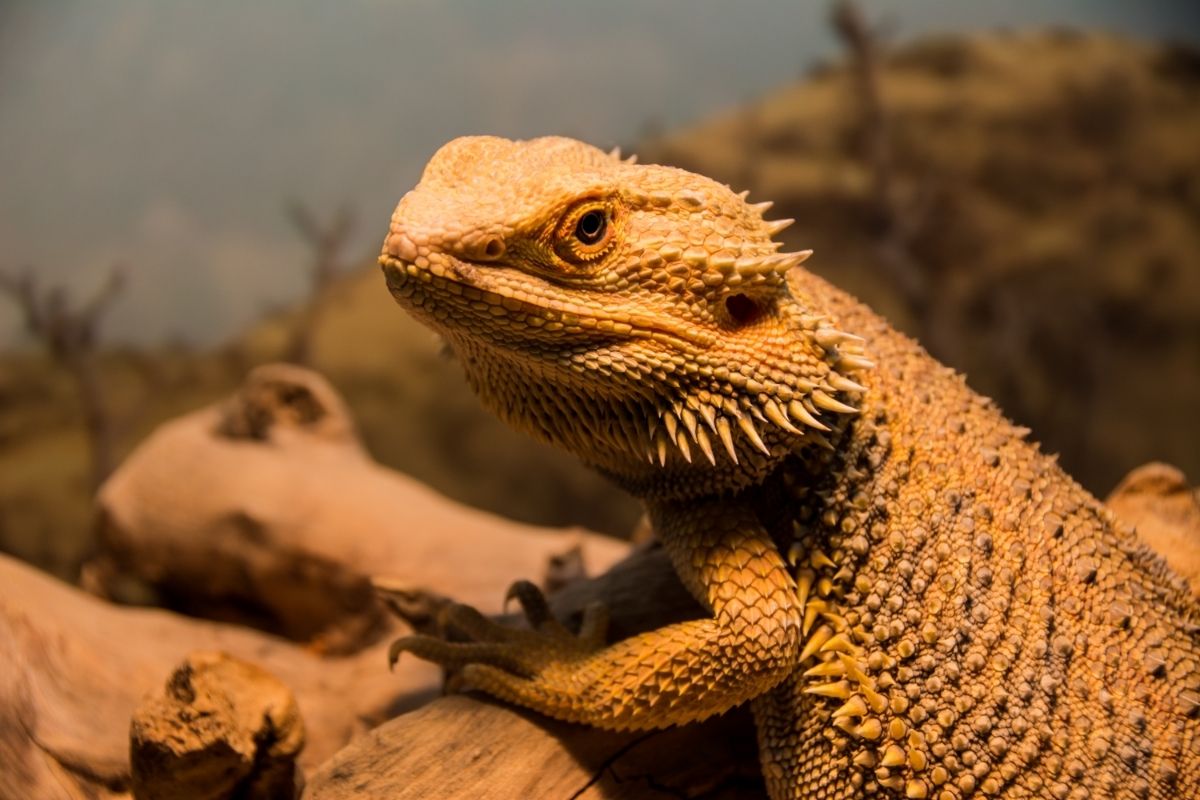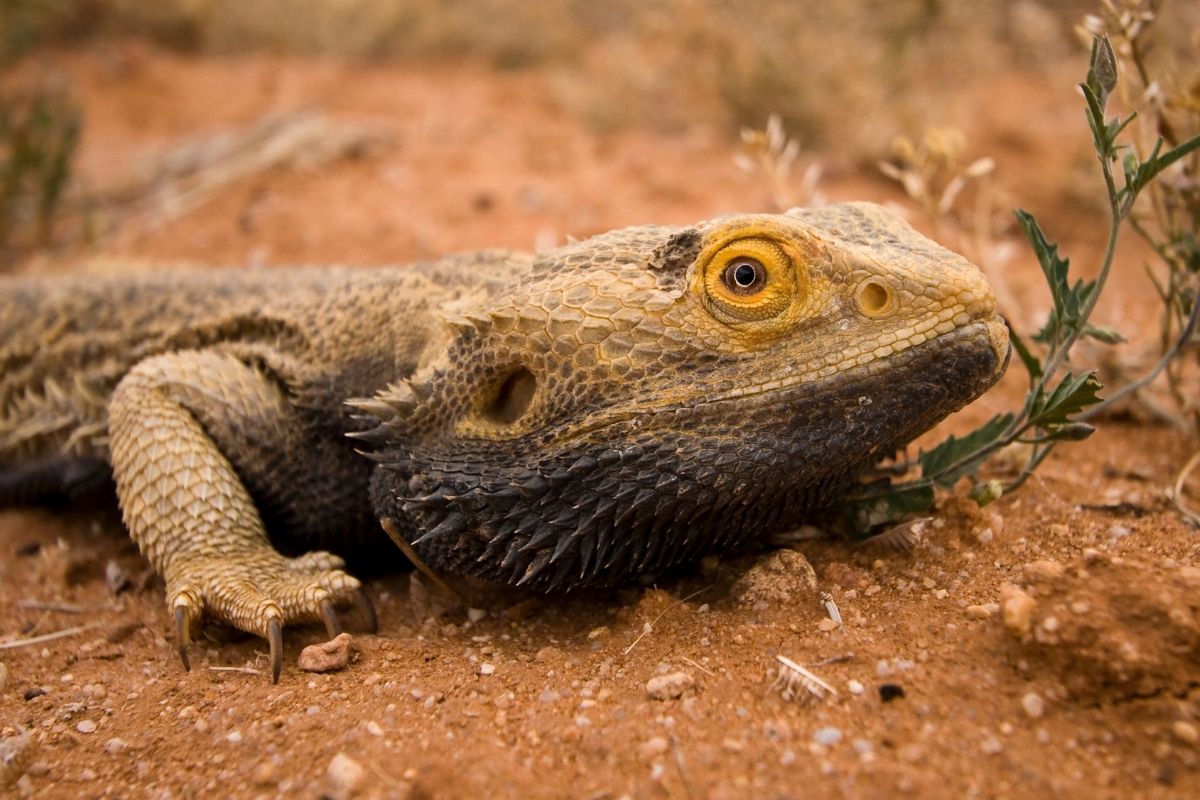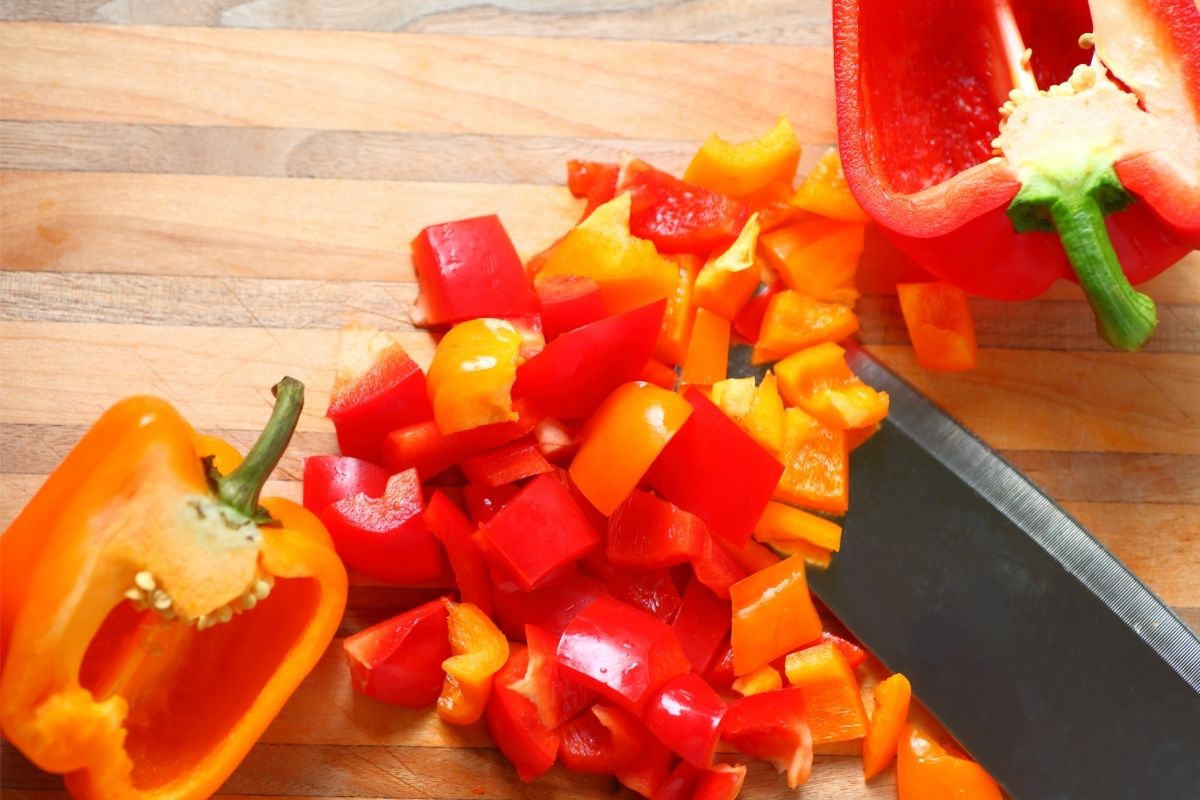Bearded dragons are reptiles that belong to the iguana family. They’re known for their long tongues and large heads.
Bearded dragons are omnivores, meaning they eat both plants and meat.

They are curious creatures who can be great pets when they are socialized correctly and can be a unique addition to your home if you don’t see yourself as a cat or a dog person.
Bell peppers are a member of the nightshade family, which also includes tomatoes, potatoes, eggplants, and tobacco.
They’re native to Mexico and South America and have become a staple part of our diet, so it seems natural to want to share them with our beloved bearded dragons.
Are you worried about giving your bearded dragon bell peppers? Bell peppers contain high levels of vitamin C, which can cause problems for some animals.
If you want to feed your bearded dragon bell peppers, then read on to find out whether they’re safe or not.
Are Bell Peppers Good For Bearded Dragons?
The short answer is that bell peppers can be great additions to your bearded dragon’s diet, and they will enjoy the crunchy and slightly sweet experience that comes from the tasty peppers.
Firstly, it’s worth looking into the nutritional value of bell peppers and what they can do for your bearded dragon’s diet.
These creatures have slightly different dietary requirements than humans, and they need higher levels of calcium than we do in a typical week.
This is why it is recommended that you dust their live food with a calcium supplement at least twice every week.
It is worth speaking with your veterinarian or a reptile expert for recommendations on the types of supplements to include in your bearded dragon’s diet.
Most bearded dragon owners add a supplement to their food because certain vitamins are harder for them to get through their food.
This includes vitamin D mostly, which is essential for them to absorb calcium.
Vitamin C is also good for their immune system, as a deficiency can impact your reptile’s growth and development.
Bell peppers are great sources of vitamin C for humans and bearded dragons.
They also have a very high water content, which can be a great way of hydrating your reptile companion.
Bell peppers contain other vitamins which your bearded dragon will benefit from. These include vitamins K1, B6, and E.
Unfortunately, they are low in calcium, which is why you should consider adding a supplement to their diet on a regular basis.
Try to avoid relying on bell peppers for your bearded dragon’s natural intake of vitamins and minerals, as they don’t have enough of certain vitamins which are important for your bearded dragon.
When it is given as a treat in addition to their regular food, bell peppers cannot do any harm to your bearded dragon.
Do Bearded Dragons Like Bell Peppers?

While it is perfectly safe to feed your bearded dragon bell peppers, it’s worth noting that they may not like it.
Some bearded dragons have a preference for the taste of a certain color, whereas others will not eat bell peppers at all.
It comes down to the type of foods your bearded dragon is used to and their taste.
Try not to force bell peppers on them if they aren’t overly enthusiastic about it or if they eat around it in their food bowl.
It doesn’t mean that there is anything wrong with them; your bearded dragon probably just isn’t the biggest fan of bell peppers.
Unlike other peppers, bell peppers will not be spicy at all. This is because they do not contain capsaicin, which is responsible for the heat that other peppers give off.
You will, therefore, not have to worry about giving your bearded dragon bell peppers for this reason.
Red bell peppers tend to be the color of choice for most bearded dragons. This is due to the slight sweetness, which is more prevalent in the red peppers.
Green bell peppers are easier to choose when they are under-ripe, which adds to the slightly bitter taste they can have when they have not been cooked.
However, it all comes down to the preference of your bearded dragon and what color. If any, they eat more of it.
Bell peppers can generate mixed responses when presented to bearded dragons, so it is worth closely watching them when you introduce bell peppers to their enclosure for the first time.
How To Prepare Bell Peppers

It is important to remember that your bearded dragon will struggle to eat a bell pepper if you present it to them as an entire pepper.
It is essential that you finely dice it and don’t give them too much at any time so that they can still get their nutrients from their regular diet.
The first part of preparing a bell pepper for your reptile companion is picking the right pepper in the store.
Make sure you choose a ripe pepper that is firm enough to resist being squeezed slightly in your hand.
It is also worth picking a red, orange, or yellow bell pepper over a green one if possible.
Green bell peppers are more likely to be underdeveloped and have a bitter taste, which is what makes them ideal for cooking.
However, green peppers will be less appreciated by your bearded dragon purely because of the taste.
The next step when preparing the bell pepper for your bearded dragon is to wash it thoroughly.
Remove any foreign bacteria and germs which can be harmful to them and cause sickness. This is a very simple step, but extremely important.
You will then need to dice your bell pepper into small pieces finely.
This is so that your bearded dragon can pick up the pepper easily with their mouth and chew.
Use it as a treat or add it to their salad once a week for a change in textures and colors.
You can also blend peppers with spinach and yogurt and feed them small spoonfuls at a time for a different experience.
Keep It Varied
It’s essential to remember that you should avoid giving your bearded dragon the same foods every day.
They can easily get bored with it and even begin to protest. This applies to bell peppers too.
Try not to give them small amounts of bell pepper every day because it will get a little dull for your reptile friend.
Try to stick to a variety of foods when you are preparing a small salad for your bearded dragon.
Bell peppers work well with sweet potato, turnips, green beans, or butternut squash.
You can prepare their food in a shallow bowl or place them around their enclosure for an enriching scavenger experience.
Make sure you are keeping a close eye on where the food ends up to avoid nasty smells from happening over time.
Like us, bearded dragons need a complex variety of food on a regular basis in order to stick to a healthy diet.
Too much water in bell peppers can lead to diarrhea, and they are high in phosphorous.
This is something that can actually reduce the effectiveness of calcium in your bearded dragon’s body.
It is, therefore, important that you don’t give them too much bell pepper on a regular basis to avoid this from happening.
Foods To Avoid Giving To Your Bearded Dragon
While bearded dragons are relatively easy going creatures that enjoy a varied diet, it is worth acknowledging some of the foods that they should not eat.
Try to avoid giving them any of the following foods in order to keep your bearded dragon healthy.
Like bell peppers, spinach, and beet tops can lead to calcium deficiencies if too much is eaten.
It is therefore worth giving your bearded dragon these foods sparingly, and avoid giving them too much of these in a regular week.
Avocados can seem like a tasty treat for us, but they can be lethal to your bearded dragon.
They contain harmful chemicals, which can have fatal consequences if they eat a large amount.
Citrus fruits are also likely to upset your reptile’s stomach, so these are worth avoiding.
In terms of meats, you should avoid giving your bearded dragon insects that you have caught yourself.
This is because they have a higher risk of carrying parasites, which will be incredibly harmful to your bearded dragon.
Dragonfish, seafood, and any insects that light up, such as fireflies, can be harmful too, so it is worth avoiding these.
Other plants which are poisonous to bearded dragons include crocus, daffodils, ivy, chestnut, oak, and poppy.
It is generally recommended that you stick to foods that you are certain are safe for your bearded dragon to avoid stomach issues and potentially more severe consequences.
Frequently Asked Questions
Are Bell Peppers Good For Baby Bearded Dragons?
Bell peppers are high in vitamins and nutrients, which are essential for bearded dragons to grow and fully develop.
However, they can reduce the effectiveness of calcium. Calcium is crucial for baby bearded dragons who are still developing.
For that reason, it is recommended that you combine bell peppers with other foods which have a high calcium content.
In spite of this, you can still give bell peppers to your bearded dragon in small amounts, even when they are young.
Should I Cook A Bell Pepper Before Giving It To My Bearded Dragon?
There is no need, as it can affect the texture and overall nutrient content of the bell peppers.
It is less likely that your bearded dragon will enjoy the taste and texture once you have cooked bell peppers.
Because of that, it is worth preparing bell pepper when it is uncooked to give to your bearded dragon.
How Frequently Should I Give My Bearded Dragon Bell Peppers?
It is generally recommended that you give your bearded dragon small amounts of bell pepper once or twice a week.
This can allow them to enjoy a varied diet without losing out on the nutritional benefits that come with bell peppers.
It is also avoiding giving them too much at once so that the calcium that they get from other foods is not reduced.
How Many Meals Should I Feed My Bearded Dragon In A Day?
This depends entirely on the age of your bearded dragon. Make sure you are not feeding them too often or infrequently, according to their age.
Speak with your veterinarian or reptile specialist if you are concerned about your bearded dragon’s diet.
It is generally recommended that you feed them a diet consisting of equal parts insects and vegetables and aim for 4-5 meals per day until they reach six months old.
Then, you can reduce this to 2-3.
What Type Of Bowl Should I Use?
You can place your bearded dragon’s food in a small, shallow dish or tray so that they can reach it.
Alternatively, you could add certain foods directly into their enclosure.
This makes it a little easier for them to access and encourages them to search for certain foods that they cannot necessarily see.
Water bowls can also be added using jar lids that have been turned upside down.
However, it is worth noting that they won’t necessarily use it, and they can still become dehydrated.
Summary
There are many things to be aware of when you are considering the types of foods to give to your bearded dragon.
For those who have additional concerns and questions, it could be worth speaking with a reptile expert or your veterinarian.
Make sure you are taking good care of your reptile companion and that you are keeping them well-nourished and hydrated.
Like most humans, bearded dragons enjoy a verified diet with different textures, colors, and types of food.
Bell peppers can be ideal additions to their salad once or twice a week in order to keep things varied and ensure that they are eating correctly.
Remember to use them sparingly, as they can lead to health complications for your bearded dragon.
